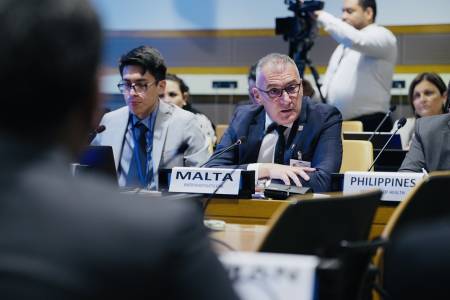Minister for Health and Active Ageing Jo Etienne Abela is in New York in the United States where he is attending the UNGA80 during which, among others, a number of health-related topics are being discussed. For another year, non-communicable diseases (NCDs) and mental health is the main theme being discussed between a number of Ministers and professionals from around the world.
“Non-communicable diseases are a silent pandemic – preventable, but ever increasing. Mental health is the foundation of our well-being and must be given priority where early monitoring does not always require advanced technology, but concerns regular physical and mental examinations, organised throughout life,” Minister Abela remarked in his intervention.
Regarding NCD screening in primary care, Minister Jo Etienne Abela explained how the Maltese Government has taken the political decision to invest in prevention and early detection that saves lives. He explained how in recent days Malta has launched the National Strategy 2025–2030 linked to the prevention of NCDs as well as continued to strengthen strong national programmes that all have high participation, including:
- More than 70% of women between the ages of 50 and 69 participate in breast cancer screening every two years.
- Colorectal cancer screening for adults between 55 and 74 years old reaches around 60% and in the next three years there are plans to lower the eligible age to 45.
- Cervical cancer prevention is advancing, with primary HPV testing for women aged 27 to 60. An HPV vaccine has been introduced for girls aged 12 and above, and is now also being offered to boys. First and second dose uptake figures are well above the EU average of 62.7%, and are between 81% and 87% in our country.
- As of 2022, abdominal aortic aneurysm screening for men aged 65 has reached over 70% participation.
Dr Abela also mentioned that our country is working on a National Cancer Plan which will aim to expand screening services, introduce genetic testing, and potentially launch new initiatives for prostate and lung cancer.
“Early detection of mental health problems is a key component of both our mental health and suicide prevention strategy, with investments in mental health first aid, community outreach, and the integration of mental health into primary care. Health is not just the responsibility of a ministry, it is the foundation of every nation and of our global future. Prevention cannot be a privilege for just a few – it must be universal, effective and accessible,” concluded Minister Abela.
Dr Asmus Hammerich, Director of the WHO Eastern Medical Region, praised the work of Maltese professionals also at an international level related to the prevention of NCDs. He mentioned aspects of the WHO strategy on NCDs, on which the advances made by our country in this area are built.
Photo: MHA
![]()








